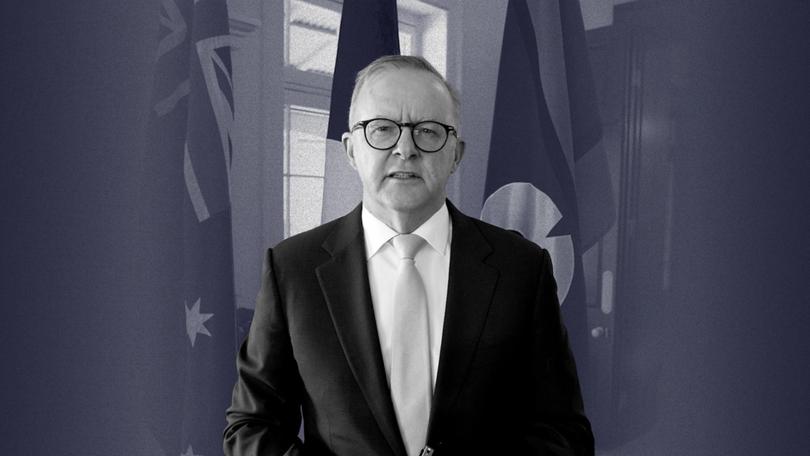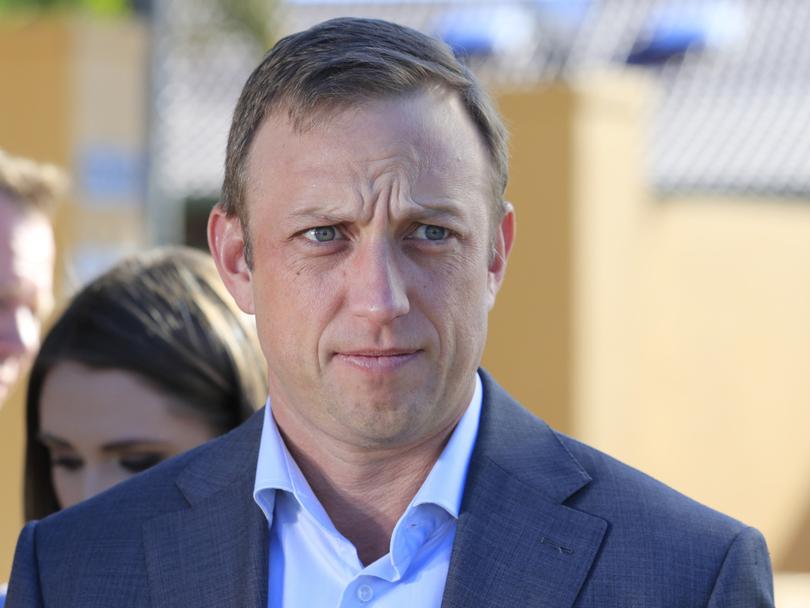Paul Murray: Federal Government’s totalitarian misinformation Bill is woefully misinformed
Broken promises, some foolhardy legislation and dwindling popularity have put Anthony Albanese and his Government in a downward spiral.

The aphorism that there’s no such thing as a free lunch has worked its way into the Australian lexicon over the past 50 years. But not necessarily into political behaviour.
It was a simple caution, popularised by the American economist Milton Friedman, that hidden costs or obligations are always associated with seemingly free offers.
Queenslanders are digesting the implications of its Labor Premier’s $1.4 billion pre-election pledge to provide free lunches in the State’s public schools.
Sign up to The Nightly's newsletters.
Get the first look at the digital newspaper, curated daily stories and breaking headlines delivered to your inbox.
By continuing you agree to our Terms and Privacy Policy.It appears the major hidden cost would be having spendthrift Stephen “Giggles” Miles continue as Premier if the promise worked as intended.
Miles dusted off a Greens policy that Labor previously derided for his potential election winner, the latest of $9b in debt-funded populist spending bribes released in a desperate, but almost certainly forlorn, bid to hang on to power.
And there was Prime Minister Anthony Albanese standing next to him on the campaign trail in Brisbane on Monday, also resolutely trying not to look like a loser despite that day’s depressing opinion poll news.
This is where Australia is at in the dreaded election season. Lots of free stuff. Like trips to the zoo purportedly to help household budgets. Really?

And lots of attempts by politicians to distract voters from their lack of achievement in office — and to obscure what they are really doing.
That apparently is somehow less harmful than the dreaded misinformation Federal Labor wants to outlaw in draconian legislation it will try to ram through Parliament before Christmas.
Queensland goes to the polls next Saturday, WA is up on March 8 and then we get to the big show whenever Albanese decides on a date to face the people — an imperial fiat that seems archaic in “transparent” modern politics. Fixed terms keep incumbents more honest.
Hopefully, rubbing shoulders with profligate Labor premiers — whom the Reserve Bank of Australia blames for inflaming our inflation problems through unrestrained spending — will not give Albanese any new campaign ideas. The nation is still waiting for his last set to land.
How’s that $275 lower power bill promise looking? Or was that just misinformation?
There was a certain sense of symmetry between this week’s anniversary of the crushing failure of Albanese’s referendum and his government’s first loss in the nation’s most influential opinion poll.
It’s like the indigenous Voice came back to haunt him right on cue.
As if Albanese wasn’t already in enough trouble with this ill-conceived Bill, the biggest single assault on free speech that I’ve seen in 50 years of journalism.
Monday’s Newspoll confirmed the downwards trajectory Albanese and Labor have been on since Australians resoundingly rejected the proposition that he fashioned as the hallmark of his government from the very first words spoken in his election night victory speech.
The real problem for Albanese — having fallen behind the Coalition courtesy of a drop in the Greens vote which didn’t flow to Labor’s primary — is that the trajectory has some way to go. It’s all about trends.
Old hands like the soon-to-be-departed Bill Shorten see the writing on the wall. Shorten clearly couldn’t abide the thought of another three years in Opposition, something that must increasingly haunt Albanese’s darker moments.
Meanwhile, Albanese and the architects of the Voice are still unable to come to terms with the repudiation. Their “hurt” and denial about the causes is ingrained.
But they’re not the real victims of the referendum’s failure. That’s the Indigenous people in parlous circumstances who put their faith in promises and are now left — like republicans — in limbo.
A sign of how a year has changed little in the mindset of those responsible for the referendum’s defeat came in a curious offering by its main non-government protagonist, Megan Davis.
In a speech last week at the University of NSW, Professor Davis called for misinformation legislation to protect any future referendum from what she called “Trumpian” lies and distortions.
She has previously blamed misinformation for the loss of the referendum — despite a series of expert studies disproving that claim — and ironically sounds like Trump remonstrating about his own electoral losses.
Davis prefers to paint the public as gullible fools when studies show the Voice model failed because the majority judged it to be divisive by treating one group of Australians differently on the basis of race.
Davis probably didn’t mean her invocation of the misinformation legislation to be a form of payback punishment for Albanese. But the emptiness of her argument exposed the dangers in Labor’s new law.
As if Albanese wasn’t already in enough trouble with this ill-conceived Bill, the biggest single assault on free speech that I’ve seen in 50 years of journalism.
In arguing that such laws would have led to a different referendum outcome, Davis provided the perfect example of why they should never be in the hands of people like her.
It took one of the biggest flip-floppers in the referendum debate, Greg Craven, a former professor of law at Fremantle’s Notre Dame campus, to straighten up and skewer Davis.
Days after her speech, Craven — who continued to support the Voice model even though he knew it was fatally flawed — disclosed that he counselled leading Yes advocates to stop characterising opposing arguments as misinformation.
He reversed Davis’ argument, citing her insistence that the Voice should not only advise the Parliament, but also the executive, which many legal experts said would be a major impediment to success.
Democracy is messy. So is getting to the truth. It’s rarely enshrined in stone, but often hiding in the grey areas.
“For example, the idea that having the words executive in were no problem, and that the executive would never be shanghaied into major decisions by the voice, because the drafting was perfect,” Craven said.
“I think that verged on disinformation. You can tell that because at different times, different people on the Yes case, notably including Megan were saying totally contradictory things.
“When they wanted the voice to be powerful, they could say it would do lots of things. But when they wanted to reassure people that it wouldn’t be too powerful, they would say it was going to be very, very weak.”
Davis and her fellow travellers refuse to see that’s exactly what the majority of Australians witnessed. They were being confused by the Yes camp’s disingenuity.
Which is why the line “if you don’t know, vote No” cut through.
In exposing Davis, Craven spotlit the essential aims of the misinformation Bill: Labor wants to silence the voices they oppose by making disagreeable words fit a legal definition of harmful misinformation.
The mainstream news media built reputations on their ability and diligence in getting to the truth, cutting through misinformation. By scrutinising both sides of the argument. It didn’t need legislation.
Social media has been happy to usurp our role as news providers, but has not been so willing to correct those who would seek to misuse their platforms.
But that is not an invitation for governments to provide thought police with draconian powers, shredding free speech and adding a further “chilling effect” on every citizen’s right to expression.
Governments cannot be trusted with such an interventionist role. Because they are run by politicians. It’s an individual’s responsibility to weigh all sides of the arguments they read and hear.
The idea of faceless bureaucrats under political control deciding not only what falls within the very broad definitions of misinformation and disinformation, but also whether the material has the ability to cause “serious harm” is alarming.
Those are arbitrary, subjective judgments open to abuse.
John Stuart Mill said it best in On Liberty, 165 years ago: “The peculiar evil of silencing the expression of an opinion is, that it is robbing the human race ... those who dissent from the opinion, still more than those who hold it.
“If the opinion is right, they are deprived of the opportunity of exchanging error for truth: if wrong, they lose ... the clearer perception and livelier impression of truth, produced by its collision with error.”
The dark political arts are as old as the hills. Muddying the waters. Smoke and mirrors. Feeding the chooks. Snowjobs. Dragging a red herring. Taking out the trash.
Is such routine political behaviour misinformation? Will it also be banned by Labor?
There are already accepted limits on free speech, like defamation and contempt of court laws. Society adopted them cautiously over thousands of years and has constantly monitored and adapted them to fit changing circumstances.
The internet is relatively new. The explosion of social media and its pernicious ills are even younger. Already sensible people are turning off, disgusted.
Democracy is messy. So is getting to the truth. It’s rarely enshrined in stone, but often hiding in the grey areas.
The idea that every social ill can be legislated away is plain dumb. Misguided socialism.
Disagreement in a political argument doesn’t prove the existence of misinformation. But the totalitarian ability to label one side’s views as misinformation — and outlaw it — would end any argument.
That’s what is on the line.
And no amount of free-stuff giveaways — like lunches or trips to the zoo — should distract us from that political reality.
